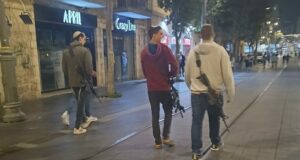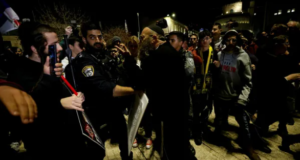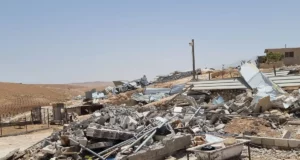By Patrick Keddie
20 May 2012 | International Solidarity Movement, West Bank
The three snapshots below are composed from interviews conducted whilst working for the International Solidarity Movement in the West Bank from September to December 2011.
FARCE
Rodni Jaber is a Palestinian woman who lives and works as a farmer in Al-Baqa’a, a windswept valley situated a few kilometers East of Hebron in the West Bank. Her family is regularly attacked by Israeli settlers and harassed by the Israeli military.
In 1998 Rodni’s son Raja was born. A few days after his birth, settlers attacked the house; one settler made a complaint to the police that someone named ‘Raja’ had put a knife to his chest, threatening to kill him.
Rodni: “Several days later the soldiers came to arrest my son. So I showed them my son who was 40 days old and I showed them his birth certificate because they didn’t believe he was Raja.”
The soldiers left but they contacted the family shortly afterward with a demand.
Rodni: “They said that Raja should come to the court and at the age of 50 days I had to take him. They said, ‘where is the defendant Raja’ and I showed them my son”.
OK, so that was the end of it then?
Rodni: “No – the judge ruled that when he reaches 16 years old he will have to come to back to court!”
Surely when the case comes to court and it becomes apparent that Raja could not even sit up or support the weight of his own head at that time of the incident, let alone threaten to harm anyone, the situation will go beyond parody?
Rodni (laughs): “Of course!”
But the ruling still stands; Raja is 12 years old now and in four years’ time he will have to go to court and explain his role in the incident.
TRAGEDY
Mustafa Tamimi, 28, was fatally injured during a protest in Nabi Saleh in December 2011. The protests began after the village’s Ein al-Qaws spring was taken over by residents of Halamish, a nearby illegal Israeli settlement, in 2009. Hundreds of protesters have been injured in Nabi Saleh but Tamimi was the first fatality during the village’s demonstrations.
Ibrahim Bornat, a 28 year-old artist and activist from Bil’in was with Mustafa when he was fatally injured.
Ibrahim: “We were alone, with the rest of the protest quite far behind. We were chasing after the [Israeli military] jeeps, telling them to leave the village.”
One jeep slowed, opened its rear door a fraction and fired two tear gas canisters directly at them, from a distance of around three meters. As the first tear gas canister was fired…
Ibrahim: “Mustafa pushed me so it went over my head, the second one hit him.”
He saw Mustafa lying prone on the floor but did not realize exactly what had happened.
Ibrahim: “I thought maybe he had passed out from the gas. I went to him and turned him over and took the cloth off his face. The side of his face was blown off, the eye was hanging out and I pushed it back but I could see the inside of his head.”
There were no ambulances around, so they put Tamimi in a service [communal taxi] but the Israeli military stopped it and tried to arrest Tamimi, until they realized how seriously injured he was.
Mustafa lay on the ground for half an hour, receiving ‘treatment’ by the Israelis. He was not allowed to leave until his ID card was found, wasting valuable time.
Although Mustafa’s heart may have been revived later temporarily, Ibrahim knew he was dead.
Ibrahim: “When I was holding him, I’m sure that he died in my arms. He let out a gasp and his soul left.”
Ibrahim was not surprised at the actions of the Israeli military.
Ibrahim: “The occupation maintains itself through killing.”
TRAVESTY
Khowla Wazwaz from Hebron in the West Bank recounts the night in 2005 when her son Moussa, then 23 years-old, was arrested by the Israeli military.
Khowla: “It was around 6pm and it was raining. The soldiers surrounded the house and started to throw sound bombs. When Moussa went outside – every gun has a laser – it was like there were hundreds of laser dots on his body.”
The soldiers told Moussa to remove all his clothes and threw him a white jumpsuit, he took it and they separated him from his family.
Khowla: “After that they started to interrogate me – [the interrogator] asked me ‘where does Moussa go, when does he come back,’ all these questions. I told him everything I knew but he told me, ‘look, the soldiers are beating him, so tell me where the gun is’. I said, ‘he doesn’t have any gun.’”
She was interrogated for three or four hours but she did not know anything. As she was interrogated, she could hear awful sounds from the next room.
Khowla: “I heard someone screaming ‘mother, mother!’. I do not know if they were beating Moussa or not, I think that perhaps it was someone acting.”
Once the interrogations had ended, Moussa was arrested and taken away. The soldiers then turned their attention to the house.
Khowla: “They destroyed the inside of the house. We have a library and they started to open fire [with live ammunition] at the books, they destroyed the computer and took the hard drive.”
Khowla was denied permission to speak to or visit her son for a year after this arrest. Moussa was given 8 life sentences for participating in the resistance – a total of 792 years. He has consistently denied any wrongdoing and was released on 18 October 2011 in the first wave of the deal to exchange Palestinian prisoners for captured Israeli soldier Gilad Shalit.
But Moussa was not released home to his family in Hebron. He was exiled to the Gaza Strip against his wishes, which Palestinian prisoners’ group Addameer describes as “a grave breach of the Fourth Geneva Convention and qualifies as one of the most serious war crimes.” At the time of the interview (November 2011) the family had not been able to visit him.
[This piece is part of an exhibition in creative journalism at the Nolias Gallery, London running from 19-23 May 2012, which features work by a range of journalists and photojournalists, including a selection of David Shaw’s photography from Palestine.]
 International Solidarity Movement Nonviolence. Justice. Freedom.
International Solidarity Movement Nonviolence. Justice. Freedom.


